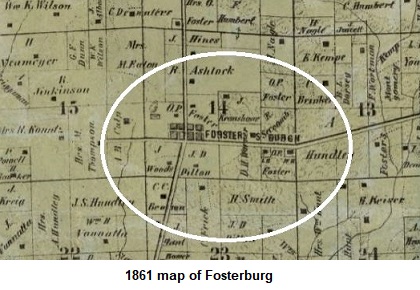History of Fosterburg (Smooth Prairie)
Fosterburg Newspaper Articles Fosterburg Tornado
In 1819, Oliver Foster, a native of New Hampshire and veteran of
the War of 1812, and his wife, Hannah Eldred Foster, came to Madison
County, Illinois, and settled for a few years in Upper Alton. In
1825, Foster and his family moved to property he received from the
government on Smooth Prairie, one mile north of what would become
Fosterburg. He was a skilled mechanic and erected what was later
designated as the Foster Inn or Tavern, the finest residence in the
township. The tavern was located on the Springfield Road (Fosterburg
Road), which was the regular stage route from Alton to Springfield.
It soon became a popular stopping place for travelers, and was used
as a relay station where new teams of horses were procured for the
continued journey to Springfield. Usually, the stage arrived in the
evening, remaining overnight and resuming the journey the next
morning. Many prominent people, including Abraham Lincoln, took
advantage of the accommodation offered by the tavern. After the
railroad came through the area, the tavern was discontinued. The
children of Oliver Foster included: Emira Freeman Foster
(1807-1851); Oliver Perry Foster (1813-1897); Alonzo Foster
(1816-1901); James Monroe Foster (1818-1893); Eldred J. Foster
(1821-1851); Rosaviva Foster (1825-1911); Lenora Foster (1826-1851);
and Micah Foster (1830-1910). Oliver Foster died March 1, 1855. His
wife, Hannah, died in 1866. They are buried in the Fosterburg
Cemetery.
The village of Fosterburg was platted by Oliver P. and Lucinda
Foster, son of Oliver Foster Sr., and was recorded October 12, 1857.
The original town included 4 blocks. The village was first called
“Foster,” after his father, but when application for a post office
was made in 1858, it was found that there was another post office by
that name, so “burg” was added. Another son of Oliver Foster,
Alonzo, moved to the eastern part of the county, and in 1860 laid
out the town of New Douglas.
Among other early settlers of Fosterburg were William E. Hill,
Joseph Sherfy, William Dillon, John D. Dillon, George Wood, Joshua
Wood, John Young, Alexander Hart, James Drenman, William Crowder,
Mark Crowder, William England, Samuel Wilson, David Hill, Asa
Brooks, Ransom Chandler (who erected the first house in Fosterburg),
Thomas Eaton, the Titchenal family, and James Bevill. Martin
Chandler, father of Ransom Chandler, obtained a government patent on
land in Foster Township. He, with his son, Ransom, operated one of
the first mills in Foster Township.
Early Fosterburg Businesses
Charles F. Lobbig opened the first store, and also served as the
first postmaster. The first post office was located at the Foster
Inn. Free rural delivery began in 1896.
Jacob Hoff, John Ost, and Nicholas Ost operated blacksmith shops.
Jacob Luft owned a shoe making shop.
The Ramers Brothers and John G. Gregory owned saloons.
The Pfister Feed Store and Saloon was constructed in about 1883, and
was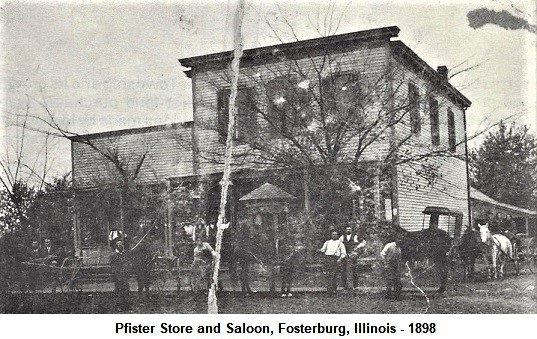 ran by John Oldenettle and Louis Pfister. It was located in
Fosterburg, on the northwest corner of Fosterburg Road and Main
Street. The Pfister building was 2-story, and had a tin roof. The
second floor was used as a hall. The hall over the store was the
scene of many gatherings. There were lodge meetings, social
gatherings such as dances and roller skating, and political
activities. The Fosterburg Band was organized and held its
rehearsals in the hall. In 1908, when Fosterburg became “dry
territory,” the saloon part of the business
ran by John Oldenettle and Louis Pfister. It was located in
Fosterburg, on the northwest corner of Fosterburg Road and Main
Street. The Pfister building was 2-story, and had a tin roof. The
second floor was used as a hall. The hall over the store was the
scene of many gatherings. There were lodge meetings, social
gatherings such as dances and roller skating, and political
activities. The Fosterburg Band was organized and held its
rehearsals in the hall. In 1908, when Fosterburg became “dry
territory,” the saloon part of the business
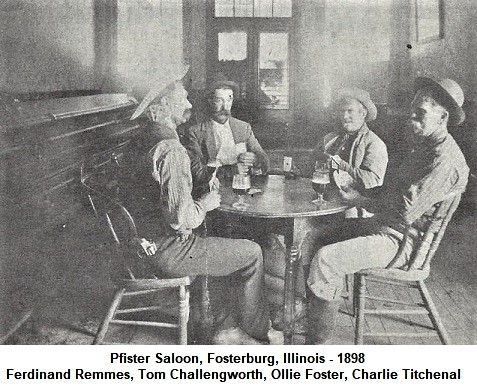 was
forced to close. This angered the owner, who remarked that the town
“could find another place for its meetings.” The old G. A. R. took
up the matter, and Memorial Hall was constructed as a community
meeting place. After the death of Oldenettle and Pfister, Van
Titchenal took over the store and built up a good business. He sold
out to Ralph Stahl, who conducted a store there under the management
of John Snyder. In 1933 the building was remodeled, and Stahl
removed the top floor of the building and added a concrete porch
across the entire front of the building. Stahl operated four stores
– Fosterburg, Moro, Bunker Hill, and Bethalto. His son, Alvin, later
took over the business. By 1944, the Stahl’s operated only the
Fosterburg store. The Stahls built a 5-room
was
forced to close. This angered the owner, who remarked that the town
“could find another place for its meetings.” The old G. A. R. took
up the matter, and Memorial Hall was constructed as a community
meeting place. After the death of Oldenettle and Pfister, Van
Titchenal took over the store and built up a good business. He sold
out to Ralph Stahl, who conducted a store there under the management
of John Snyder. In 1933 the building was remodeled, and Stahl
removed the top floor of the building and added a concrete porch
across the entire front of the building. Stahl operated four stores
– Fosterburg, Moro, Bunker Hill, and Bethalto. His son, Alvin, later
took over the business. By 1944, the Stahl’s operated only the
Fosterburg store. The Stahls built a 5-room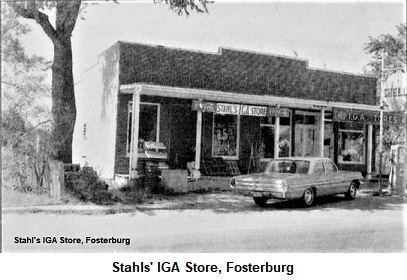
Fosterburg Cemetery
Fosterburg Cemetery, located just north of the town, was originally
a private burying ground. John C. Young and Thomas Eaton each
donated a fraction of an acre, after which it was used by the public
until 1873, when an association was organized and a charter obtained
under general law. The association purchased more land, and made
considerable improvements.
Fosterburg Churches
Three churches were erected in Fosterburg – the German Presbyterian
(1858); the German Baptist (1865); and the German Methodist (1864).
Schoolhouse
The schoolhouse was a brick structure, one-story high, with a frame
addition. In 1882 it employed two teachers.
Fosterburg Band
The Fosterburg Band was organized in 1892. Charter members included:
Charles Harris, Edwin Rinker, Charles Flackus, Otto Besser, Peter
Knecht, John Neuhaus, John Jinkerson, John McCauley, Phillip Paul,
John Ornettle, Oliver Robertson, Edwin Griebel, Robert Pfaff, Otto
Ornettle, and James Jones. The band was disbanded in 1916, but
reorganized in the 1950s with Harold Paul as Business and Public
Relations Manager; Mathew Horn was President; Lee Dodd as
Vice-President; Harry Krieg as Librarian; and Homer Schultz as
Director.
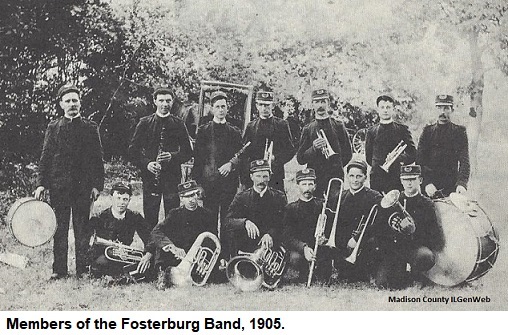
Telephone System
The Fosterburg Telephone System was established in 1903 when the
right-of-way was signed with the St. Clair and Eastern Telephone
Company. The telephone line was known as the Star Line, and ran from
Fosterburg to Alton. The company’s office and equipment were
destroyed in the 1948 tornado. Negotiations began with the Illinois
Bell Telephone Company, and the line was completed and service
renewed in 1949.
Fosterburg Town Hall
The Foster Town Hall was constructed in 1908 on land donated by
William R. Eddington, a Civil War veteran. Eddington had purchased
the land from H. G. Bassett. Eddington also donated the materials to
construct the hall, with members of the community donated their
labor to construct the building. The hall was used for a variety of
activities, including box socials, Christmas programs, church
services, school programs, and as a polling place for elections. The
hall was completely destroyed in the 1948 tornado. In 1954, a new
basement was constructed just north of the old site, which was used
until 1975, when a new town hall building of double-steel walls was
constructed at the west end of Main Street.
